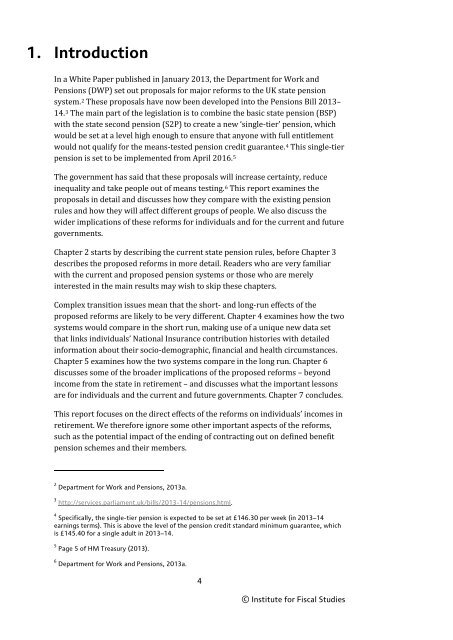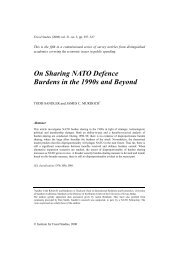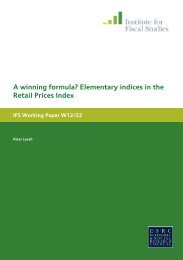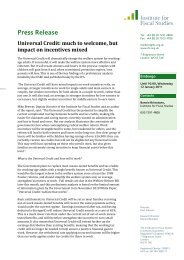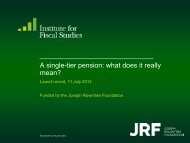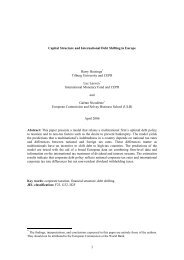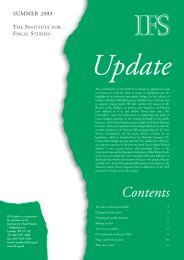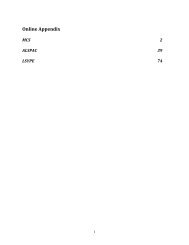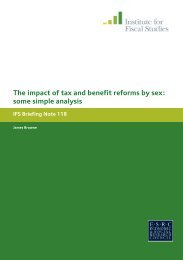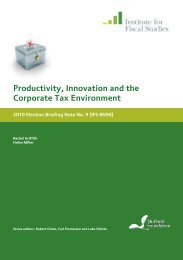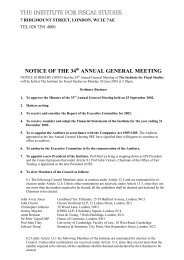A single-tier pension: what does it really mean? - The Institute For ...
A single-tier pension: what does it really mean? - The Institute For ...
A single-tier pension: what does it really mean? - The Institute For ...
Create successful ePaper yourself
Turn your PDF publications into a flip-book with our unique Google optimized e-Paper software.
1. Introduction<br />
In a Wh<strong>it</strong>e Paper published in January 2013, the Department for Work and<br />
Pensions (DWP) set out proposals for major reforms to the UK state <strong>pension</strong><br />
system. 2 <strong>The</strong>se proposals have now been developed into the Pensions Bill 2013–<br />
14. 3 <strong>The</strong> main part of the legislation is to combine the basic state <strong>pension</strong> (BSP)<br />
w<strong>it</strong>h the state second <strong>pension</strong> (S2P) to create a new ‘<strong>single</strong>-<strong>tier</strong>’ <strong>pension</strong>, which<br />
would be set at a level high enough to ensure that anyone w<strong>it</strong>h full ent<strong>it</strong>lement<br />
would not qualify for the <strong>mean</strong>s-tested <strong>pension</strong> cred<strong>it</strong> guarantee. 4 This <strong>single</strong>-<strong>tier</strong><br />
<strong>pension</strong> is set to be implemented from April 2016. 5<br />
<strong>The</strong> government has said that these proposals will increase certainty, reduce<br />
inequal<strong>it</strong>y and take people out of <strong>mean</strong>s testing. 6 This report examines the<br />
proposals in detail and discusses how they compare w<strong>it</strong>h the existing <strong>pension</strong><br />
rules and how they will affect different groups of people. We also discuss the<br />
wider implications of these reforms for individuals and for the current and future<br />
governments.<br />
Chapter 2 starts by describing the current state <strong>pension</strong> rules, before Chapter 3<br />
describes the proposed reforms in more detail. Readers who are very familiar<br />
w<strong>it</strong>h the current and proposed <strong>pension</strong> systems or those who are merely<br />
interested in the main results may wish to skip these chapters.<br />
Complex trans<strong>it</strong>ion issues <strong>mean</strong> that the short- and long-run effects of the<br />
proposed reforms are likely to be very different. Chapter 4 examines how the two<br />
systems would compare in the short run, making use of a unique new data set<br />
that links individuals’ National Insurance contribution histories w<strong>it</strong>h detailed<br />
information about their socio-demographic, financial and health circumstances.<br />
Chapter 5 examines how the two systems compare in the long run. Chapter 6<br />
discusses some of the broader implications of the proposed reforms – beyond<br />
income from the state in retirement – and discusses <strong>what</strong> the important lessons<br />
are for individuals and the current and future governments. Chapter 7 concludes.<br />
This report focuses on the direct effects of the reforms on individuals’ incomes in<br />
retirement. We therefore ignore some other important aspects of the reforms,<br />
such as the potential impact of the ending of contracting out on defined benef<strong>it</strong><br />
<strong>pension</strong> schemes and their members.<br />
2 Department for Work and Pensions, 2013a.<br />
3 http://services.parliament.uk/bills/2013-14/<strong>pension</strong>s.html.<br />
4 Specifically, the <strong>single</strong>-<strong>tier</strong> <strong>pension</strong> is expected to be set at £146.30 per week (in 2013–14<br />
earnings terms). This is above the level of the <strong>pension</strong> cred<strong>it</strong> standard minimum guarantee, which<br />
is £145.40 for a <strong>single</strong> adult in 2013–14.<br />
5 Page 5 of HM Treasury (2013).<br />
6 Department for Work and Pensions, 2013a.<br />
4<br />
© Inst<strong>it</strong>ute for Fiscal Studies


